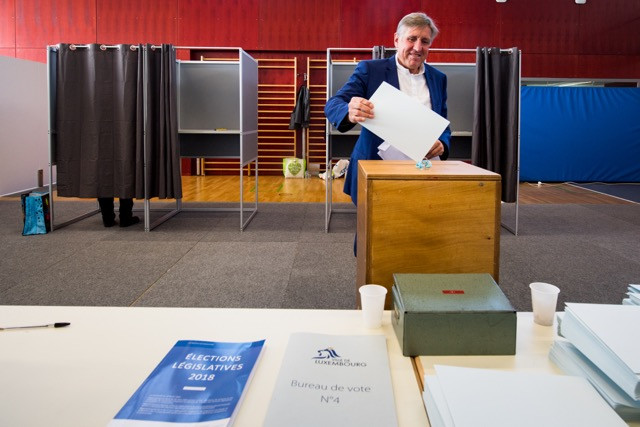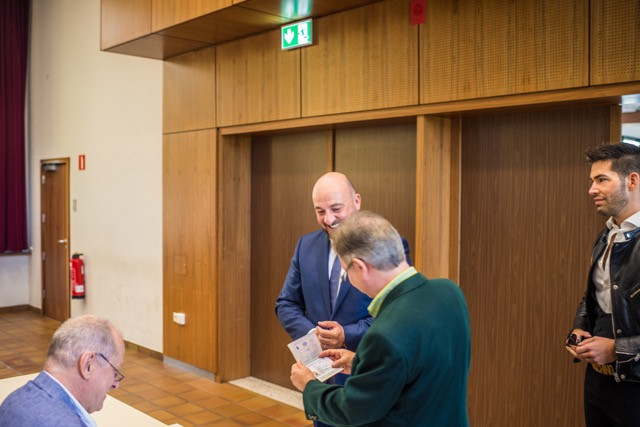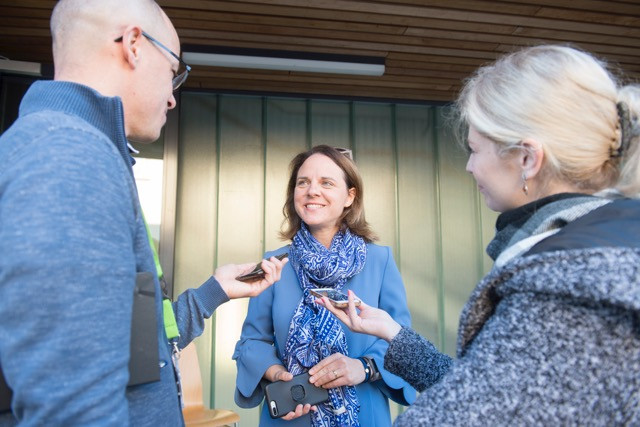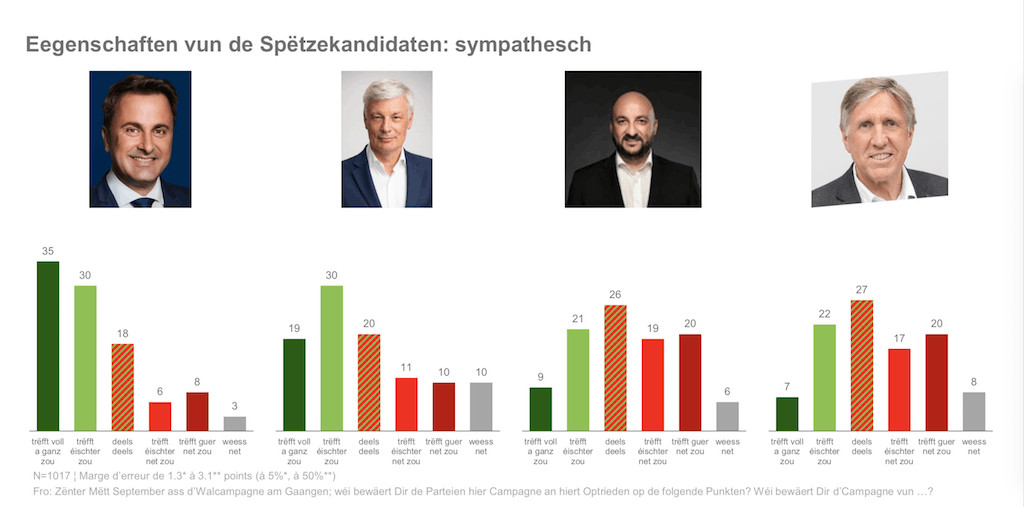21:30 DP loses seat in centre
Xavier Bettel's DP has lost 1 seat in the centre constituency. The definitive results show that the LSAP and CSV also lost 1 seat each. Déi Gréng gained 2 seats and the Pirate Party won 1 seat.
21:30 RTL calls it for Gambia
RTL's prognosis for the 2018 election reckons that the 3 current coalition parties - DP, LSAP and Déi Gréng - will win the 31 seats required to continue in government. The Greens will win 9 seats (up 3 from 2013), the LSAP also 9 (down 4) and the DP will retain its 13 seats. The CSV will lose 2 seats an only have 21 in the new parliament.
21:00 Election hangs on the south
The results from the south will decide whether the Gambia coalition manages to retain its 31 seat majority or not. Latest results show the Greens making a gain of close to 5%, the LSAP down just over 3.5% and the DP share of the vote falling by around 1%. The Pirates are currently polling at 7.5% and the CSV just over 26.6%, down from 32.2% in 2013. The ADR is at just over 9%, a gain of 1.5% and Déi Lénk have polled steady at 6%.
20:20 Pirates could enter parliament
Prognosis for the Centre constituency shows that the Pirate Party may win its first ever seat in parliament. Sven Clement would be the likely representative. Clement thinks the Pirates might even win a seat in the southern constituency. The Greens would also make a gain of 1 or even 2 seats in the centre, while the LSAP and the CSV are both likely to lose a seat and the DP might also lose a seat.
19:30 ADR expected to gain 1 seat in North at expense of LSAP
Prognosis for the North constituency suggests that the ADR will win 1 seat at the expense of the LSAP. The results so far show gains in the share of the vote for the Greens, Pirates and ADR, and losses for the CSV, DP and LSAP.
19:00 East remains unchanged
Some commentators had suggested before the election that the Greens could lose their one seat in the eatern constituency, but it looks as though they have retained it. Indeed, according to RTL it seems that the 7 seats in the east will be unchanged, with the CSV on 3 (despite losing 7.5% of its share of the vote), the DP on 2 and the LSAP and Déi Gréng on 1 each. The Grerens saw its share of the vote improve by 3.4%, the DP were up just over 2% and the Pirates polled 6.98% of the vote, up from 2.69% in 2013. The LSAP vote fell by 1.7% and the ADR are up by 0.89%.
18:30 Greens and Pirates on the up
Results coming in from around the country seem to indicate that Déi Gréng and the Pirate party have made significant gains in the popular vote. In Dudelange, for example, partial results show the Greens up to 13.6% from 10.56% in 2013, and the Pirates have made a massive leap to 8 % compared to just 2.7% in 2013. The CSV made a small gain and the LSAP, while still the strongest party in one of its traditional strongholds, has fallen from 36 to 31%.
In Clervaux, where all 8 polling stations have registered their votes for party lists, the Pirates have scored 9.85% (up from 3.82%) and Déi Gréng are on 11.34% (up from 7.66%). The ADR also made gains in Clervaux, up to close to 16% from 7.17% while the DP, CSV suffered significant losses.
Nationally, at 6.25 p.m. the Greens had passed the 15% barrier and the Pirates have over 7,5% of the vote.
17:20 results streaming in
With 79% of polling stations having submitted their results for voters who chose a complete party list, and just 20 of the 679 polling stations having submitted completed results, the election is still looking like going down to the wire.
The CSV has received 28.05% of votes registered so far, with the DP on 16%. The LSAP on 15.33% and Déi Gréng on 14.98%. Of the smaller parties, the ADR is edging towards 10%, and the Pirates have surprised everyone by polling over 8%. Déi Lénk, who had been expected to do well and even gain a seat from the LSAP, is on 5.73%.
The big winners so far, compared to the final results of 2013, would be Déi Gréng, the ADR and the Pirate Party.
15:30 polls show CSV-Green still favourite
New polling data released just after the voting closed on Sunday reveals that the electorate would most like a CSV-Déi Gréng coalition government. A poll in June had shown a similar result. The Politmonitor poll, conducted by TNS-Ilres for RTL and Luxemburger Wort between 4 and 10 October, shows that 18% of the electorate would prefer the centre-right opposition party to team up with the Greens. A continuation of the current DP-LSAP-Déi Gréng coalition is favoured by 17% and 14% would prefer a CSV-DP government to emerge from the election.
As for voter expectations, they are tied between either a CSV-Green or a CSV-DP coalition. The Politmonitor poll was conducted between 4 and 10 October. A CSV-Green or CSV-DP government was expected by 26% of those polled, while a CSV-LSAP coalition is only the expected result with 10% of the electorate. 11% believe the Gambia coalition will be the likely outcome of the election.
But the polls also show that prime minister Xavier Bettel was the favourite lead candidate among voters. He topped polls asking about assertiveness, vision for Luxembourg, trustworthiness and likeability.
14:00 Polling stations close
Voting in the 2018 parliamentary election is officially over. The first results are expected to be posted just after 6 p.m. on the official election website (in French). But it will be much later this evening before the formal results are calculated in terms of number of seats in parliament. And after that it may take weeks before any government is formed.
A tweet from the Cour Grand-Ducale shows Grand Duke Jean, Crown Prince Guillaume, Hereditary Grand Duchess Stéphanie and Prince Félix casting their votes.
12:45 Bettel feeling relaxed
Party leaders including DP prime minister Xavier Bettel and party president Corinne Cahen, the CSV’s lead candidate Claude Wiseler, Déi Gréng’s François Bausch, and the LSAP’s Étienne Schneider have all cast their ballots.
Bettel said he was going to relax this afternoon, take a walk in the woods and even leave his mobile phone in the car so as not to be distracted. “Nothing is going to change in the course of the day,” he said--interview in Luxembourgish here.
Indeed, although polling stations close at 2 p.m., first results are not expected before 6 p.m. and it will likely be after 11 p.m. before the final result is known. In an interview with RTL, Claude Wiseler said he had become aware of the pressure and challenges of being in the spotlight.
11:00 international interest
Sunday’s parliamentary elections have made the news around the world. Reuters says the electorate may return Luxembourg to “political tradition” with the CSV likely to win the most number of seats and its leader Claude Wiseler called to form a government. Politico takes a similar view, but informs readers that the CSV “will likely need to enter a coalition to reach the magical 31 seats required to form a government.” It also points out that some 52% of the population is non-Luxembourgish and therefore “whoever wins on Sunday will do so in the face of a glaring democratic deficit.” And The Times Of India leads with a headline saying that Xavier Bettel’s job is “in the balance”.



















